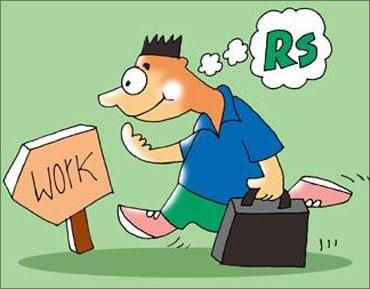60,000 NRIs back! Indian firms lure talent away from US
 370)this.width=370">
370)this.width=370">
Three weeks after being accused by United States Senator Chuck Schumer of bringing in lower-paid workers from India and stealing jobs from Americans, those dreaded Indian employers -- as well as US and other multinational corporations -- were in Edison, New Jersey, this past weekend, this time to entice highly skilled Indians in the US to head in the opposite direction. (tsk tsk)
The Indian job portal Shine.com organised 'India Calling', its first job fair in the US, for Non-Resident Indians looking to return to India for various reasons.
"The Indian economy is booming and there is a sudden huge requirement for people to lead new projects and divisions," says Nidhi Lauria, the national sales and operations head at the Gurgaon-based HT Media, of which Shine.com is a part.
She explains her clients are often looking for professionals with 'super specific domain expertise' not easily available in India, and that the US, with its economy now in the doldrums, is an ideal place to scout for such talent.
After a two-day run on August 28 and 29 in Edison, a city with a substantial Indian community, India Calling will move to Silicon Valley on the West Coast, hitting California's Santa Clara on September 3 and 4.
Around 30 companies from various sectors are taking part, including Google, Accenture, Deutsche Bank, Tata Consultancy Services, Airbus and Orchid Chemicals & Pharmaceuticals.
Lauria expects the two locations to attract over 2,500 visitors, short of their estimate of 8,000, but she says the response in Edison was 'awesome'.
Among the visitors in Edison was Raj Ilyas, a marketing manager in New Jersey, who has been in the US for the past 10 years. He notes India's brisk GDP growth and says he and his wife, an accountant, want to be part of the rapidly growing economy back home.
An automotive engineer and financial consultant, who didn't want to be named, drove to Edison for over five hours from where he lives, to circulate his resume.
His story is typical -- he came to the US in 1992 for his Masters degree, added an MBA, and now works and lives here with his wife and two children under the age of 10.
He wants to go back so that his kids can grow up near their grandparents, and wants to make the transition while the children are at an age when they can still easily adapt to the change.
Meanwhile, Ankush Agarwal, a finance executive in New York, was at the job fair out of curiosity. He and his wife, Swati, an information technology professional, describe themselves as 'global citizens', who say they will go where the opportunities are.
"If Obama raises our taxes to 60 per cent, we're gone, to Singapore, to India, wherever," says Agarwal. But he adds, "Every Indian has a wish at the back of his mind to some day move back home."
Even as India tugs at the heartstrings, the cherry on the icing is the health of its economy, especially in contrast to the ongoing slump in the US, which has produced a stubborn 9.5 per cent unemployment rate.
The recession has also created an available talent pool with rich pickings for recruiters, who say they want to take advantage of senior, experienced professionals seeking to return to India for, both, personal and professional reasons.
Padmaja Bhagat is an HR manager with TCS at their Edison office. She has met NRIs who want to move to India "in the next couple of months".
Since the US is the biggest market for TCS, Bhagat says it's a windfall for the company to attract senior professionals, who have acquired domain expertise in much-needed areas and are also familiar with the US market.
Adds Gayathri Ramamurthy, a senior hiring manager at Capgemini, who has travelled to this event from her office in Chennai, "People with 15-plus years of experience are at a crossroads today in the US. They feel their career growth has reached a plateau here, while India is the market to be in today. These are the people we want back."
Over 60,000 Indians are estimated to have moved back home from the US last year. Lauria adds that this year, for the first time, NRIs returning from the US are expected to outnumber those coming to this country from India.
She has received requests from auto companies in India to hold a job fair in Detroit, and from job seekers in the US to organise one in Texas.
So high is the interest right now that she says some visitors who came to the Edison job fair had flown in from as far away as Toronto, Chicago and Detroit, or driven from Boston and Connecticut.
Senator Schumer is not known to have commented on companies in India trying to draw away highly skilled professionals from the US.





















comment:
p_commentcount